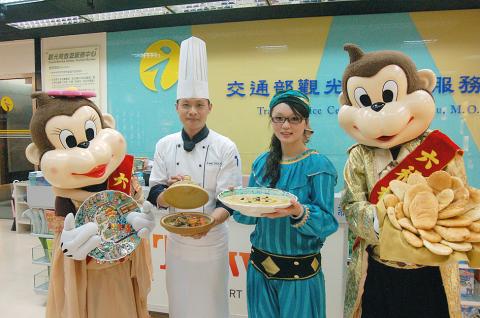The Tourism Bureau yesterday said it aimed to have 50 restaurants certified as Muslim-friendly as it looks at options to further tap into the Muslim tourist market.
Eric Lin (林坤源), director of the bureau’s international travel division, said Muslim tourists visiting Taiwan mainly come from Malaysia, Indonesia, Singapore, Brunei and northwest China.
The bureau hopes to see 10 percent growth in tourist arrivals from each of those countries this year, Lin said.

Photo: Tseng Hung-ju, Taipei Times
The frequency of broadcasts of television commercials on traveling in Taiwan in Malaysia has increased, he said, adding that the bureau has also worked with travel agencies to organize tours.
“The nation drew about 6 million tourists last year,” Lin said. “The population of Muslim countries is approximately 1.7 billion, which presents a high potential for international visitors.”
The “Muslim-Friendly Restaurant” certification was handled by the Chinese Muslim Association.
Association secretary-general Salahuddin Ma Chao-yen (馬超彥) said the main purpose of the certification was to let Muslims around the world know that there are Muslims in Taiwan as well.
Based on the certification guidelines, restaurants must ensure that the food offered to Muslims is prepared according to Islamic law. The guidelines also have specific instructions for various items, ranging from buying from certified halal food suppliers and seasonings to cookware.
The service personnel must also receive training on the “dos and don’ts” of hosting according to Muslim customs.
Eleven restaurants nationwide have already been certified as Muslim-only businesses — which serve only halal food — while there are seven Muslim-friendly eateries — businesses that serve both halal and non-halal food.
Restaurants in some amusement parks, such as Leofoo Village Theme Park in Hsinchu County, are among those that have been certified.
Jozo Chen (陳怡穎), marketing specialist at Shangrila Leisure Farm in Yilan County, said the farm hosted about 1,000 Muslim tourists last year.
“Apart from the food, they [Muslim tourists] also require a separate dining area to eat,” Chen said. “We must also have arrow signs [pointing to Mecca] for their daily prayers and proper washing facilities in the hotel rooms.”
Chen said the cost of hosting Muslims is slightly higher than that of non-Muslim tourists, but the certification would help the hotel attract more tourists from Muslim nations.

Chinese Nationalist Party (KMT) Chairman Eric Chu (朱立倫), spokeswoman Yang Chih-yu (楊智伃) and Legislator Hsieh Lung-chieh (謝龍介) would be summoned by police for questioning for leading an illegal assembly on Thursday evening last week, Minister of the Interior Liu Shyh-fang (劉世芳) said today. The three KMT officials led an assembly outside the Taipei City Prosecutors’ Office, a restricted area where public assembly is not allowed, protesting the questioning of several KMT staff and searches of KMT headquarters and offices in a recall petition forgery case. Chu, Yang and Hsieh are all suspected of contravening the Assembly and Parade Act (集會遊行法) by holding

PRAISE: Japanese visitor Takashi Kubota said the Taiwanese temple architecture images showcased in the AI Art Gallery were the most impressive displays he saw Taiwan does not have an official pavilion at the World Expo in Osaka, Japan, because of its diplomatic predicament, but the government-backed Tech World pavilion is drawing interest with its unique recreations of works by Taiwanese artists. The pavilion features an artificial intelligence (AI)-based art gallery showcasing works of famous Taiwanese artists from the Japanese colonial period using innovative technologies. Among its main simulated displays are Eastern gouache paintings by Chen Chin (陳進), Lin Yu-shan (林玉山) and Kuo Hsueh-hu (郭雪湖), who were the three young Taiwanese painters selected for the East Asian Painting exhibition in 1927. Gouache is a water-based

Taiwan would welcome the return of Honduras as a diplomatic ally if its next president decides to make such a move, Minister of Foreign Affairs Lin Chia-lung (林佳龍) said yesterday. “Of course, we would welcome Honduras if they want to restore diplomatic ties with Taiwan after their elections,” Lin said at a meeting of the legislature’s Foreign Affairs and National Defense Committee, when asked to comment on statements made by two of the three Honduran presidential candidates during the presidential campaign in the Central American country. Taiwan is paying close attention to the region as a whole in the wake of a

OFF-TARGET: More than 30,000 participants were expected to take part in the Games next month, but only 6,550 foreign and 19,400 Taiwanese athletes have registered Taipei city councilors yesterday blasted the organizers of next month’s World Masters Games over sudden timetable and venue changes, which they said have caused thousands of participants to back out of the international sporting event, among other organizational issues. They also cited visa delays and political interference by China as reasons many foreign athletes are requesting refunds for the event, to be held from May 17 to 30. Jointly organized by the Taipei and New Taipei City governments, the games have been rocked by numerous controversies since preparations began in 2020. Taipei City Councilor Lin Yen-feng (林延鳳) said yesterday that new measures by